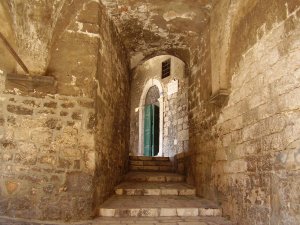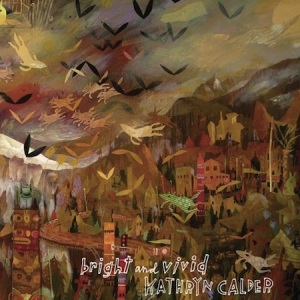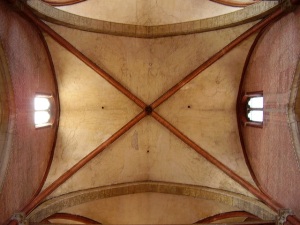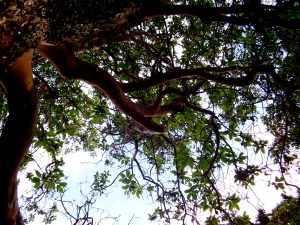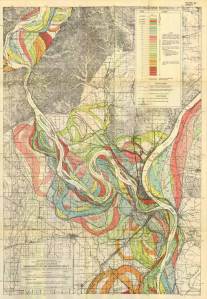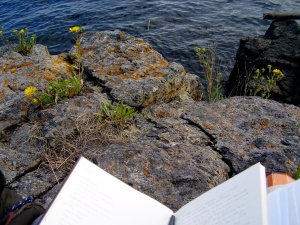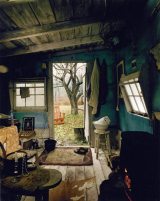today, a poem
14 November 2011 § Leave a comment
“Dried Figs” is written by the Croatian poet Andriana Škunca. I’ve only been able to find a handful of her poems that have been translated into English, and that handful makes me want to take up Croatian again, so that I can translate more of her work.
She lives on the island Pag and the poems I found all seem to be made out of the fabric of her life there. They have this quiet intensity to them that draws me, like a moth to light.
Grains of light in a dried fig, and beebread for autumn’s bitter mouth. An empty cup chimes to a close on the table. Beside it, mint and lemon. A bee snatched at a ray of sun, covered by a cold shadow like a butterfly.
The wall grows dark. The wine is bottled, taste of over-ripened grapes. The figs, plucked long ago, dry on the board. Late summer clings to the moistened fruits. Sweetness glistens.
In the box, between the stems, blackness. Now to add two or three bay leaves to separate the thick clumped fibres, press them in silence.
By Christmas, crystals on the skin. A dusting of sugar. Frost stalks the hands of the clock. It seems that hoarfrost has fallen from the lid, blanched the room, figs and our fingers.
– Andriana Škunca, translated from Croatian by Kim Burton
fragments
11 November 2011 § Leave a comment
Early nights, November. Windswept leaves, clarity. Rain. Sun streaming through my windows in the morning, blue skies, that slant of light.
Emily Dickinson said: “So I found / that hunger was a way / of persons outside windows / that entering takes away.”
I think November is the month of ‘outside windows.’ The feeling of worlds within worlds, a hunger for places and persons and things, a hunger filled best with wonder, poetry, imagination, conversation.
This month, my favorite.
* * *
Sometimes poetry lets me stand outside windows. The hunger is good. It makes me write.
* * *
I had a dream the other night.
I was writing poems about houses, dwelling places. And the person in my dream was giving me advice: first, she said, start with the interior, the small spaces. Then move outward into the in-between spaces. Then even farther, into the beyond, the far spaces. Then bring someone with you, and walk through these spaces again.
I woke up and I was writing all of this down onto a piece of paper.
I think I will actually write these poems. The advice seems sound: a movement, inner to outer, a journey started alone but ended with someone else beside you. It reminded me of being inside Gaston Bachelard’s The Poetics of Space, if that book were translated into a dream.
“An enlarged ability for missing is perhaps a part of our better growth, as the strange Membranes of the Tree broaden out of sight.” (Emily Dickinson)
6 November 2011 § Leave a comment
Snippets: Bon Iver’s gorgeous cover of Sharon Van Etten’s “Love More.”
‘bright and vivid’
28 October 2011 § Leave a comment
This fall has seen the arrival of some excellent albums. Loney Dear’s Hall Music. Lisa Hannigan’s Passenger. Feist’s Metals. Kathryn Calder’s Bright and Vivid. Radical Face’s The Family Tree: Roots. Katie Herzig’s The Waking Sleep. My Brightest Diamond’s All Things Will Unwind.
Just to name those that come straight to mind.
For the music-loving fiend in me, this has been a delight. Not only do I love these musicians, I really love these new albums. A lot.
(Coldplay will not be named among these. How did we get from “Amsterdam” to “Every Teardrop is a Waterfall”? That is all I have to say.)
I digress. What I mean to say is, out of all these aforementioned musicians, I’ve been most happily surprised with Kathryn Calder’s Bright and Vivid. She released her first album just last year, but there’s a world of difference between that album and this. Not to say her first album was less than stellar–it has a brighter sound to it, more Laura Veirs, less Wye Oak. And it is delightful, channeling both playfulness and seriousness to good effect.
This new album, though, is truly a mature statement. From the atmospheric beginnings of “One Two Three” to the heartbeat thrum of “New Frame of Mind,” it’s a darker-toned and haunting enchantment whilst retaining her first album’s lighter touch at certain points (“Five More Years” or “Who Are You?”). Calder’s voice is lilting and lacy, but it never fades into the background. What I love most? There’s an urgency to this record, a pulse that pulls me through it start to finish. Then I can’t help but begin again.
So I must say: Kathryn Calder, Bright and Vivid is one of the best albums I’ve heard this year.
this element, water
24 October 2011 § 1 Comment
Now there are times I put water in a jar and look at it, clear, beautiful, and moon-loved element that it is. I think of it, an element that amazing, one that moves aside for us. Sometimes there is a wellspring or a river of something beautiful and possible in the tenderest sense that comes to and from the most broken of children, and I was one of these, and whatever it was, I can’t name, I can only thank. Perhaps it is the water of life that saves us, after all.
(from The Woman Who Watches Over the World, Linda Hogan)
“won’t let go”
21 October 2011 § Leave a comment
David Bazan’s song “Won’t Let Go” has been on repeat of late. The song is written for his wife, but when I first heard it, I was in the Dallas-Fort Worth airport, like he is in the song, waiting for my connecting flight to Cincinnati. And I was thinking of how, just fourteen days before, I was about to let go of Christ, ready to slip outside of the skin of that faith. But then I went away, and now I was coming back. And this chorus kept ringing: “I will not let go, I will not let go, I will not let go of you.”
Was that me singing to Christ? Was that Christ singing to me?
I was broken, but hopeful. I was on my way home from two weeks of intense community with people dear to me. There were the days spent with one of my best friends, walking in the rain, driving through the mountains, talking, being. There was the residency time, with the joy of learning and ideas, with pockets of conversation everywhere with beautiful people, people increasingly dear to me, people with whom I feel at Home. And God. God haunting my steps every day, showing up, a presence I couldn’t explain away.
Two weeks. Two weeks away from my normal routine, and God saying: I will not let go. And my reply: I will not let go of you.
My plane landed. I drove home at midnight. I cried all the way.
How do I hold this? I kept asking myself. How do I hold?
Two and a half months later, I keep asking that question. I will not let go. I will not let go. But sometimes I don’t know what I am holding. I just hold. I keep holding.
The struggle for faith folds us within our questions, all of us wondering if God exists with us where we are, if God even sees who we are––and loves. I feel folded right now, as you may feel today, or tomorrow, or someday.
Somewhere in the middle of the mystery: that’s where you’ll find me. And somewhere in the middle? God, not letting go.
confession
17 October 2011 § 2 Comments
“But we have only begun
To love the earth.”
I’ve had those lines from Denise Levertov’s poem “Beginners” ringing in my head of late. In fact, a lot of words have been ringing in my head. A few weeks ago, I did some research for a poem on the trash gyres in the Pacific and the Atlantic, and came away from that with a sick stomach, a heavy heart.
It sort of astounds me, when I read about gyres of plastic and trash in the oceans, or when I hear about the plans for the Tar Sands pipeline, that we, including myself, still don’t understand what we’re doing to this earth by living the way that we do. It still feels far enough away that we can pretend it’s not happening to the extent that it is, and that all of this blindness won’t come back to haunt us in the end.
And I worry that I still can’t fully fathom it, though I try to, every day. I worry that none of us can fathom it, and so most of us live in chosen ignorance.
“How could we tire of hope?”
I want so many others, thousands of others, hundreds of thousands, to hope with me–an active hope, a hope that is speaking out, acting, saying that tikkun olam is possible. I want this, but I let myself become discouraged, focused on all those that aren’t hoping, thinking I am the only one hugging hope to her chest in a dark corner. Not so. You’re out there. I see you.
I’m as guilty as anyone else. That’s why this post feels more like a confession for me than a rallying cry. I want to come clean. I want to say: this is my problem, too. I need to own up to my complicity in the environmental crisis. I do what I can to ameliorate the problem, from past volunteer work to the small tasks I undertake everyday: washing cans and bottles, putting them in the recycling bin, upcycling clothes, eating locally. But still. It doesn’t feel like nearly enough. Not that I will stop, nor should anyone stop: these small things are good, necessary. But I think the problem is that I’ve let them make me feel comfortable, complacent. I haven’t been charged with urgency, and I need to be. We all need to be. I’m realizing I need to do more, whether taking on more of an activist’s role, or writing more about this, or educating myself and anyone else who will listen with me.
“So much is unfolding that must
complete its gesture,
so much is in bud.”
So much is alive, still. This earth is resilient. But I need to pay attention. I need new ways to “imagine justice and mercy” and “envision / how it might be / to live as siblings with beast and flower, / not as oppressors.” And I need to do this now.
Will you join me?
My heart is heavy with these things. I feel the weight of our collective oversights, greed, and push to take what is not ours to take. I confess I have missed the mark. I have not always done what should have been done; I have done what should not have been done. Forgive me.
“So much is in bud.”
May I see it, may we all see it–and hope toward it, working to “complete its gesture” here on this earth. Here, now.
(All quotes in italics are from “Beginners” by Denise Levertov.)
map-making
20 September 2011 § 2 Comments
A few months back, I received a sudden flash of an idea: create an atlas-book out of fabric. Embroider it with maps of old places you’ve loved, new places you’re going, real and imaginary landscapes of memory and imagination. Embroider it with poetry. It goes along with my ongoing love of ecocriticism, the study of literature and the environment, and, particularly for me, constructions of place and identity in relationship to the natural world. I think maps are an interesting sub-category of this in terms of how they vision our human negotiations with the natural world.
I’m especially interested in subverting an idea of a map as a statement of knowledge or domination, and instead using it to declare uncertainty, imagination, and humility in terms of one’s sense of place.
I am a bit of a geek about these things and could go on for centuries.
Working on this book has allowed me to fuse my love of embroidery and sewing to my love of books, my love of poetry to my love of textiles. I think there’s a crucial link between material culture (sewing) and the life of the mind (ecocriticism), and want to negotiate between the two in this physical object. Plus, it’s just plain old fun.
* * *
I dreamed of it as a book made out of linens and scraps of fabric from my own stash, but I wanted it to be mostly created with fabric from friends. I appealed to these friends to send me their weary old scraps, and I received a bounty! I laid them out on my table and waited for the next idea to come. A little while later, it did. I started working on the cover, embroidering it with a title and patchworking some pieces of fabric together to form hills. Now, images grow clearer in my mind of how I want the rest of the book to follow after this beginning, taking the idea of “plates” as one would have them in an atlas and reinventing them in my book in various ways yet to be determined. It’s very much an unfolding process.
I want to share this map with you. It’s so visually striking, I keep dreaming about it. I plan to use it as an inspiration for an embroidery pattern in the book somewhere.
my urban homestead
5 June 2011 § Leave a comment
A lot of things have happened in the last few years that have made me want to try my hand at a certain kind of urban homesteading. Now that I have my own apartment in the city, I have the space to experiment with how sustainable living can fit with city life. Such a shift has meant small, incremental changes. I bought a compost bucket for my food scraps. I reorganized my recycling methods so that most everything I use can be recycled. Those were the first steps.
Then spring came, and I learned that I am gluten intolerant.
Suddenly, my desire for urban homesteading met with a very real need to make a fast lifestyle change, one that complements my desire for a more holistic lifestyle because it requires me to be conscientious about everything I take into my body and use on my body (even my shampoos and cosmetics can have gluten-related ingredients in them). Gluten is in so many things I never thought about before. Oh, and if you are wondering what gluten is, it is a protein found in wheat, rye, and barley.
I feel so grateful for this shift in my life. Knowing that I can control chronic pain through my diet gives me the autonomy I have been longing for. It also gives me the chance to revolutionize the way I eat, making me source all of the foods I can eat to come from as close to their pure form as possible, since processed foods have more of a chance to have some sort of gluten in them. So, goodbye, goodbye old way of thinking about food–hello, creative experimentation!
Now I get the chance to experiment with flours I’ve never heard of before, like teff flour, garbanzo bean flour, and almond flour. I know that gluten-free baking can taste just as good or even better than baking with wheat––it just takes some time and finesse and creativity. With the help of some great cookbooks and food blogs, I feel like adventures in the kitchen are going to be just that: adventures.
And, today I decided it was time that I made my own shampoo, since I discovered that my shampoo has ‘hydrolyzed wheat protein’ in it. I thought, why not make my own shampoo? Then I will know exactly what ingredients are in it.
I’ll share my recipe once I’ve tried it and determined that it works as a shampoo, not just as a nice-smelling mixture. Suffice it to say, I made it with a castile soap base, adding vegetable glycerin, coconut oil, lavender essential oil, and a ‘tea’ made out of sage, rosemary, and nettle.
—
But I can share the recipe for this salad, which I have been refining over the last several weeks. You can’t go wrong with balsamic vinaigrette.
Warm Chicken Salad with Pecans, Golden Raisins, and Balsamic Vinaigrette
Serves 4-5
1 pound chicken breast
A hefty amount of spring greens/lettuces (think 4-5 servings). Use whatever mixture you like. I used the mixture I had in my CSA box this week.
1/2 c.-3/4 c. pecans
1/2 c. golden raisins
Bleu cheese to sprinkle over the salad
Balsamic vinaigrette
1. Cut up the chicken into strips and saute them in 1 tbsp. coconut oil (you can easily use olive oil if you don’t have coconut oil).
2. While the chicken’s cooking and keeping one eye on it, prepare the salad mixture of greens/lettuces, pecans, raisins, and bleu cheese. I prepare mine straight on the plate(s) and then save the rest of the salad mixture in a bowl (without the dressing on it) for later meals.
3. Once the chicken is done, I cut the strips into smaller pieces before placing on the salad. Then I swirl some vinaigrette over the plate and it is dinner time. The recipe for the vinaigrette is below.
I make the balsamic vinaigrette beforehand. Here’s my recipe, but you can adjust to taste.
2 parts olive oil to 1 part balsamic vinaigrette
Fresh basil and lavender (buds and/or leaves), torn into pieces
Two cloves of garlic, sliced into smaller strips
Mix everything together in an old jar and, voila! It gets better as it ages.
And this salad recipe is basically a build-your-own sort. Add any variation of dried or fresh fruit that you like or seems great to you. Avocados are wonderful, too. Fresh herb sprigs. Other sorts of nuts. Basically, make it your own.
Enjoy!
artistry and bravery
4 May 2011 § 4 Comments
Anyone who practices art must be brave.
I think of this because of the confluence of several things. One: my colleague received a packet of letters from students who had read his essay ‘Why Draw?’ (you can read it here), and it started all Sorts of Thoughts. I was moved for him to receive such a response to the essay, because it had clearly struck a chord with these high school art students. Here’s a sentence from his essay that’s lingering with me: How to convey that drawing is […] the result of an entrenched discipline of searching, discovering, failing, succeeding… through the tip of a pencil?
In order to do those things – to search, discover, fail, succeed – you need to be brave, because it is going to take everything you have. It will take time and failures will be many.
But I am realizing anew how absolutely necessary my failures are and that they are more vital to my growth than anything else. Thus, the bravery. Later in his essay, Tim mentions that the practice of drawing is a painful process. But to have a “life of looking,” as he says, one must keep trying. Keep looking.
I believe this applies to all artistic practice, whether visual, literary, or musical.
I’ve been writing series of sonnets lately & realizing how the practice of writing them has become my own way of looking. They require a certain sort of bravery in me, because they do reveal my weaknesses more than I’d like to admit. Yet I need to be reckless. Not in the sense that I recklessly throw my words about on the page without care or thought, but that I am willing to write these sonnets even if more often than not I struggle with the form, feeling that it is conquering me rather than I conquering it. I need to keep pushing the form, keep breathing in iambic pentameter, keep wrestling with rhyme schemes, and know that my failures are the essential part of any movement toward realizing my vision.
To write a good poem, I need to write scores of bad ones. And I think this requires a certain sort of bravery. I think this is particularly apparent to me in writing formal poetry because of needing to balance the form with fresh language that shimmers and is utterly new.
Case in point: I’ve had a sonnet that’s been particularly hard to see. Last night, I felt really irritated with it. (I talk to myself when I write–call me crazy–and kept talking back to the poem.) So I tore it apart. It felt kind of reckless to do that. I had spent weeks building it up, and here I am slashing away nearly all of it. It’s as if the housebuilder decided that they were going to take apart nearly all of the house they’d just built, leaving just a few pieces standing.
I kept four phrases that I thought were at the heart of what I was seeking to create. With them, I built the house again; I wrote a new sonnet. It is still not perfect, but I feel that I moved the poem. And it was hard to do, because it required me to face up to the poem’s weaknesses in the first draft phase and not ignore it until the second or third revisions when it would become too hard to ignore (when the house begins to totter, the wind shakes it and…goodbye, house!).
Also, I think an artist (visual, literary, musical) must be brave because there is an essence of truth-telling that must underlie the work, if it is to relate to who we are as human beings & reach into the commonplace of our lives. This is something I hope to flesh out further as I continue writing a paper on Czeslaw Milosz, a poet I admire for bravery in his vision of poetry, for a poetry never separated from the world & its harshness, its beauty. The demands to truth are terribly exacting. They require a certain sort of fortitude; the artist can’t look away. This isn’t easy. But it is necessary. I’ve been thinking more and more about what Milosz said in his poem “An Appeal”:
“If one day our words
Come so close to the bark of trees in the forest,
And to orange blossoms, that they become one with them,
It will mean that we have always defended a great hope.
How should I defend it? By naming things.”
This has become a little mantra for me of late. How shall I defend a great hope? By naming things. By giving memory (cultural, personal, social) & the essences of what it is to be human its embodiment in words, by remembering, and by bringing to life that memory so that the particular is not forgotten–so that abstraction will not win the day.
So I choose bravery. I choose trying over and over and over again. I choose ripping my poems to pieces to build them up again, to write and rewrite and rewrite.

